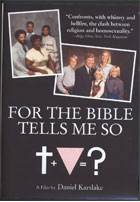
For The Bible Tells Me So 2007
Distributed by First Run/Icarus Films, 32 Court St., 21st Floor, Brooklyn, NY 11201; 800-876-1710
Produced by Daniel Karslake
Directed by Daniel Karslake
DVD, color with b&w, 97 min.
Sr. High - Adult
Gay and Lesbian Studies, Religious Studies
Date Entered: 03/26/2008
Reviewed by Rebecca Adler, College of Staten Island, City University of New YorkOf the three social political causes that ignited the Nineteen Sixties, two have pretty much entered mainstream mores. You’ve only to consider that the next president of the United States may be a woman or an African American to appreciate that the country has, as Lena says in Faulkner’s Light in August, “come a fur piece.” Despite impressive strides since the third cause, the acceptance of homosexuality as a norm in the spectrum of human behavior, has many a mile yet to go. For the Bible Tells Me So is a powerful documentary film that sets out to explain why that may be the case – and indeed, the title encapsulates part of the explanation.
The American Medical Association, The American Psychiatric Association, the American Psychoanalytic Association, The American Psychological Association, The American Academy of Pediatrics, and The National Association of Social Workers, to name but the most relevant professional organizations, have all come to treat homosexuality as a normal and irreversible behavior, and furthermore see the effort to reverse the behavior as destructive and demeaning to the subject. Regardless, certain church leaders, mainly though not all of an evangelical cast, selectively quote the Bible and disappointingly continue to refer to the practice of gay and Lesbian sex as “an abomination.”
For the Bible Tells Me So is structured essentially by the histories of five Christian families, all of them observant, whose lives are transformed by the homosexual orientation of a child. The parents, conditioned by a strongly negative predisposition, eventually come to accept the homosexuality of their lesbian and gay offspring, in some cases even to celebrate it. Two of the cases are somewhat familiar because of their prominence in the news. Bruce Robinson, who rose in the Episcopal Church to become Bishop of New Hampshire, comes from a pious Southern family whose parents nonetheless respond to their son’s homosexuality with unquestioning love. It’s sad to learn that during his investiture as bishop Robinson had to wear a bullet-proof vest, so real and terrifying were the numerous death threats that attended the event. (Not mentioned in the film is the schism Robinson’s election produced in the Episcopal world with some priests relocating to as far away as Uganda in search of a diocese that repudiated the choice.) The second family is the Gephardts. Daughter Chrissy weeps telling how much it meant to her that her father Richard, onetime House of Representatives Democratic Leader, when he ran for president, asked her to campaign on his behalf and not hide her sexual persuasion. (Father and daughter together made the cover of People Magazine.) Elsewhere the father of the African American Poteat family, serving with his wife as the tandem ministers in a Southern Baptist congregation, speaks a line that could easily have been written by Woody Allen. After his two children, a boy and a girl, were born, he says he prayed, “God, please don’t make my son a faggot, and please don’t make my daughter a slut.” “He did not,” Reverend Poteat continues with an ironic smile, “he did not do it! He reversed it.” Shocking and tragic is the fate of Anna Wallner, a woman in her late twenties. Her mother Mary Lou relates that after sending a letter saying she could never accept, in keeping with the teaching of her church, her daughter’s lesbianism, Anna hanged herself. Mary Lou Wallner is later seen speaking to a congregation denouncing the church’s view of homosexuality and participating in a gay liberation demonstration.
As for the Evangelicals, it will suffice to report on a sermon by Jimmy Swaggart, who has a following of millions and has earned millions. To a cheering congregation, he proudly announces, “If a man ever looked at me, I’d kill him – and tell God he died.”
The film dispenses with a voiceover narrative, evidently unnecessary inasmuch as it is presumably the only reasonable one, is clearly and persuasively conveyed by the content. Indeed the film emerges as a powerful indictment of the ministers who continue to promulgate – for profit to a trusting credulous populace – a teaching that is dubious and selective in its interpretation of Scripture. This is a deeply moving work that one hopes will reach audiences beyond the already enlightened. Highly recommended.
Awards
- Best Documentary, 2007 Seattle International Film Festival